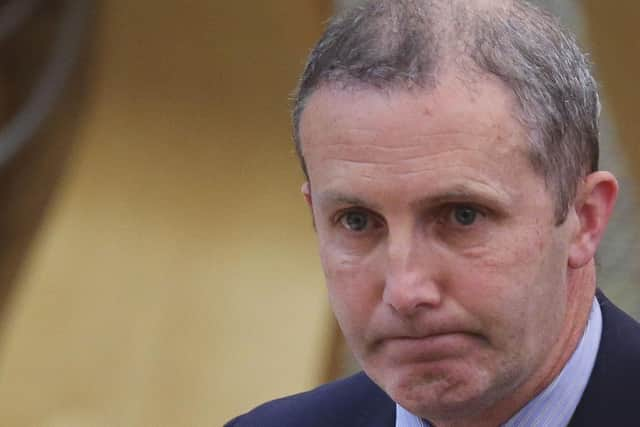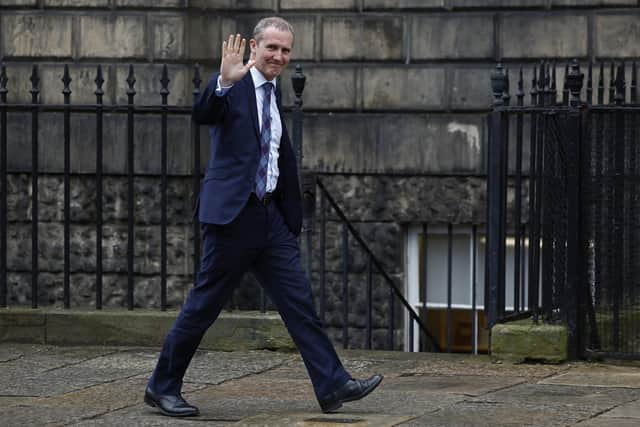Proposed National Care Service will help fix ailing NHS Scotland, declares health secretary Michael Matheson
Newly-appointed health secretary Michael Matheson has backed the controversial National Care Service to help fix an ailing NHS, saying it will counteract health inequalities as he revealed the level of sickness presenting at hospitals is higher than before Covid.
After inheriting a failing NHS Scotland from his now-boss, Humza Yousaf, Mr Matheson has found himself tasked with turning around a healthcare system that recently experienced the worst accident-and-emergency (A&E) waiting times and delayed discharge numbers in the institution's history. He must also manage a growing revolt from unions, who are pushing back against years of pay erosion for their overwhelmed members.
Advertisement
Hide AdAdvertisement
Hide AdThe two statistics – A&E waiting times and delayed discharge numbers – are vitally important to the healthcare system. Speaking exclusively to The Scotsman, Mr Matheson said his tenure as health secretary should be judged on these figures, as well as the effectiveness of the overall healthcare system in a decade’s time.


“In my view, primary care and preventive health care are critical to supporting us in achieving that,” he said.
“And what I'll be looking to do over the months as we go forward is setting out more clearly how I want to go about delivering that in order to make sure that we get a healthcare system in ten years ‘time, that is serving us effectively, both at a primary and a secondary care level.”
Primary care statistics, such as emergency waiting times, and discharge figures can be thought of as the inflow and outflow of hospitals, and give a very good indication of the system’s overall health.
These statistics impact on all areas of health. A&E waiting figures increase when there are not enough available beds on wards, due to delayed discharge – the figures for which increase when there aren’t enough available care settings for patients to be discharged to.


Since taking over the health brief in late March, Mr Matheson has overseen some green shoots of recovery, but levels are still way off pre-pandemic figures, and even those recorded immediately following the end of lockdown in January 2021.
“There are a number of factors that have been causing this [historically low performance],” Mr Matheson said.
“The level of acuity – sickness – that is now presenting at hospitals is greater than it was pre-pandemic. People are sicker when they’re turning up at hospitals, which means that the length of stay that people now have in hospitals has increased as well.
Advertisement
Hide AdAdvertisement
Hide Ad“The length of stay has gone up by I think almost a day and a half from where it was pre-pandemic, so people are staying longer in hospital because of that higher level of acuity.”


When pressed for his plans to improve primary care, such as A&E and GP surgeries, Mr Matheson unveiled plans to emphasise “preventative healthcare” and to reduce the number of bed-blocking delayed discharges – central to which will be the delayed and controversial National Care Service (NCS).
Last month, social care minister Maree Todd wrote to the Scottish Parliament’s health, social care and sport committee, informing it the first vote on the NCS was to be pushed back until after the Holyrood summer recess.
Ms Todd said this would allow for "compromise" to be reached. The service’s critics have pointed to a lack of clarity in the plans to take responsibility for adult social care from health boards and give it to new regional boards, as well as the concerns about the overall cost.
“Hospitals often deal with the health inequalities that are caused in society,” Mr Matheson said. “The reality is that the healthcare system is basically dealing with the consequences of social inequality.
“So if you want to tackle some of these issues, we need to tackle issues of social inequality and income inequality in society to tackle the health inequalities that then have an impact on our health service and how they blight people's lives and communities as well.
“We need to have a health care system that is also preventative in being able to manage long-term conditions much more effectively, so that people don't develop the complications that come from the poor management of long-term conditions.”
Social care will be key to this, Mr Matheson claimed. However, he said social care had always “played second fiddle” to healthcare in terms of its value in society, and that has been “reflected in how people are paid within the sector”.
Advertisement
Hide AdAdvertisement
Hide Ad“We need to change that,” he said. “Social care is as critical to supporting the National Health Service as the National Health Service is to supporting social care. They are both interrelated.”
Mr Matheson said his department would attempt to close the pay gap between social care and healthcare, but stressed due to the “significant resources involved”, it would “take time”.
“The reason we need to do that is because we need to make sure that social care is seen on an equal footing and it seems an attractive setting for people to go and work in,” he said.
Despite believing pay is an issue with recruitment and retention in the care sector, Mr Matheson said “pay is not an issue” with healthcare professionals such as nurses and doctors. He instead blamed recruitment issues on the limited number of specialist roles in less-populated areas, Brexit, and the knock-on effects of austerity on the Scottish Government’s coffers.
When asked whether those views were contradictory, Mr Matheson said: “The point I'm making is that where social care has come from is a much lower base, because society's relative values have been that social care has not had the same priority.
“On the pay side, I’d reiterate the point, we have the highest paid staff in the UK in NHS Scotland, so we are putting more resource in to make the NHS an attractive location, and by recognising that we need to do more on social care side.
“That's why the First Minister has said their commitment to moving towards the £12 an hour [minimum wage for care staff], but it will need to be done over a period of time because of the level of resource that will be involved in doing that.
“The environment in social care is different as well, because you've got a combination of public, private and independent.
Advertisement
Hide AdAdvertisement
Hide Ad“Again, it reinforces the need to move to a National Care Service, so we can get a much more consistent approach in how social care services are being delivered across the country and the type of terms and conditions and status we would have alongside that.”
Comments
Want to join the conversation? Please or to comment on this article.